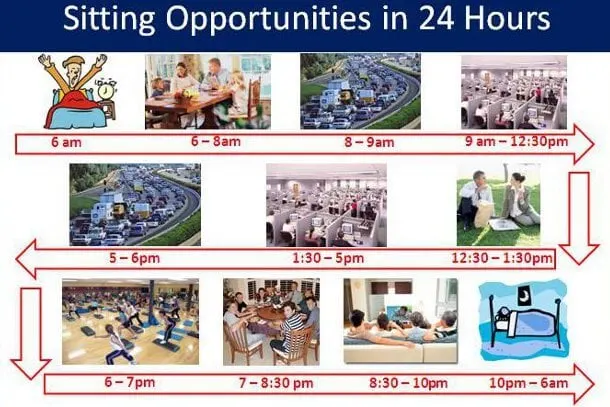Non-exercise activity thermogenesis sounds like a scary name. And in practice it can be even more scary to innocent bystanders!
I get lots of strange looks every time I go to the supermarket – EVERY time. People usually do a casual glance, and then it’s one of those double-take moments where they have to take a better look to be sure their eyes aren’t playing tricks on them.
Today was no different. I made eye contact with a woman in the produce section a few minutes after I’d arrived at the local Woolworths supermarket.
Ten minutes later we crossed paths again in one of the aisles, at which point she vocalized what most people were probably thinking, “You should get a trolley (shopping cart) for all those things!”
I was carrying two overflowing handbaskets which were about 15 to 20 kilos each by that point and starting to get pretty darn heavy.
Without missing a beat, I responded, “But ah, there’s more to the story than meets the eye.” “‘Inactivity physiology’ is one of my professional research interests, so I have to practice what I preach!”
I proceeded to give her the Reader’s Digest version of why it’s important to nix the trolley and shop the old fashioned way. Though in her defense, she did say she’s got four kids that keep her on the run!
While everyone shouts the benefits of structured exercise from the rooftops, there is evidence that even if you do your 30 minutes of moderate to vigorous activity five times per week, your health can still remain at risk if you spend too much time lounging around watching TV (Abstract here). In other words, it’s what you do when you’re NOT exercising that really matters, both for weight control and health.
According to an article by James A. Levine of the Mayo Clinic Endocrine Unit published in the Proceedings of the Nutrition Society, Non-Exercise Activity Thermogenesis, NEAT for short, refers to “energy expended that is not from sleeping, eating or sports-like exercise. It ranges from the energy expended walking to work, typing, performing yard work, undertaking agricultural tasks and fidgeting” (see article by Levine).
Without getting into the numbers on calorie burning, the big picture is that when it comes to LOSING WEIGHT and keeping it off, this NEAT background activity plays a crucial role that, over the long-term, can and does make a massive difference.

I know this is ironic coming from an exercise physiologist, but I think we need to effect a shift in our collective views on background activity and structured exercise. Structured, packaged exercise is still important but it should play second fiddle to incidental movement such as standing work stations and, in general, sitting avoidance for the bulk of the day.
Sure, I think it’s a good idea to park farther away from the mall entrance and take the stairs, but if this is only done for a few minutes a day, then it pales against a backdrop of excessive sitting the rest of the day. And I can’t say I’m a fan of sitting on an exercise ball all day either. Once your body adapts to it, then the “training effect” would be minimized into oblivion.
The following image is from one of my seminar slides and highlights a typical day in the life of the average person. Despite hitting the gym for one hour a day, after an eight hour sleep, that still leaves 15 hours of opportunity to either do absolutely nothing or waste energy. It’s not hard to see that time at the gym is minimized, if not negated, by excessive sitting at other times of the day.

I stopped into the bank this afternoon to take care of some business and, after ascertaining the reason for my visit, the teller told me to “have a seat” while I waited. I told him I “preferred to stand,” to which gave me a funny look as if to imply “well that’s strange.”
We’ve become so numb to physical inactivity that we’re not even aware of our own actions (or inaction). During my seminars on inactivity physiology, I often pose a question to the audience, “Does anyone have any vivid recollection of the physical act of sitting down in your chairs today?” Most people take a moment to ponder it and invariably shake their heads as if to say, “I’m sorry senator, I have no recollection!”
It’s the same as putting on your seat belt in your car. It’s so automatic and permanently ingrained that physical INACTIVITY has become a conditioned and expected habit.
How pathetic are we to have arrived at a point in history where we have to pay money to go into an external box called a gym to do simulated activity that was previously innate, even required, for our day to day survival? How sad is it that we actually have to STAND UP to take a break where historically we needed to SIT DOWN to have a rest after a full day of hunting, gathering, and fending off predators?
There is a prevalent mentality that by doing nothing we can “save energy.” Unfortunately, it doesn’t work this way. Physical activity is the only game in town where you need to SPEND energy to GET energy.
One of the most valuable practical lessons I learned was from working with cardiac patients. Some people came into our cardiac rehab program so physically debilitated that even the most basic activities we all take for granted were extremely difficult. From this, I coined a little phrase along the lines of, “You don’t appreciate your ability to move until you LOSE your ability to move.”
Finally, the National Weight Control Registry is an on-going study which tracks and trends people who’ve lost weight and kept it off over a long period of time. There are a number of factors which contribute to successful weight loss, but several of them caught my eye:
- 78% eat breakfast every day
- 75% weigh themselves at least once a week
- 62% watch less than 10 hours of TV per week
- 90% exercise, on average, about 1 hour per day
Reading between the lines, you don’t need to starve yourself or go on some sort of wacky diet- have breakfast and enjoy it. You don’t need to stress over your weight every day – the scale is not your friend. Spend more time “wasting” energy doing incidental movement and less time ass-down in front of the television. And finally, yes, it’s still good to do structured exercise but more as a complementary routine to your innate, primal movements!
You want the secret to losing weight and keeping it off, the secret that diet book authors and infomercial exercise gadget hucksters don’t want you to know? Here it is: the secret is that there IS no secret. Move more (a LOT more), eat less (particularly less refined/processed foods), quit smoking, and get a daily dose of laughter!


Debbie
Tuesday 8th of January 2013
Intuitively this article resonated with me. I really miss being able to roll up my car windows with a crank! Now that can keep your arms toned. It really is the little things done constantly that make the biggest difference. Thanks!
Christallin
Tuesday 18th of October 2011
You are so dead on with this article. Americans barely want to move let alone exercise in a structured fashion. We have everything from automatic light switches to toilets that flush themselves and we wonder why there is an obesity epidemic?
Bob
Tuesday 31st of January 2012
I've suscpeted this for awhile. I've had to dig through what resources I could find, online and in bookstores, regarding weight loss and separating the fact from pseudoscience. My interest came out of having to lose nearly 80 pounds to become a candidate for bariatric surgery, then losing another 90 pounds after that (it's been a little over a year since going under the knife.)In the course of researching diet and exercise, everything I read gradually pointed me to conclude that while exercise is good for the body (bone strength, stamina, etc.) for weight loss, unless you are employed as a weightlifter or aerobics instructor or some other profession where you're spending hours burning calories instead of largely being sedentary, exercise simply isn't a magic key to losing weight. If a below-average American meal will take hours to burn off in the gym, it's simply not feasible to work off the excess calories from a donut or pizza. Especially when people tend to reward themselves for a hard workout with some other "treat" afterwards.I'm not a scientist and haven't studied any of this in controlled conditions, I've only tried compiling information and look for trends and observe what's happened to myself and a few other people around me. But so far it seems the best way to lose weight and/or keep weight off is to monitor your caloric intake and keep notes of how many calories your metabolism normally burns and adjust accordingly. You don't have to work off that donut if you never ate it.That certainly doesn't mean you shouldn't take the stairs instead of the elevator though. Exercise is great for other things. Just not weight maintenance (for the average person.)
Christallin
Sunday 16th of October 2011
Excellent! I just wrote a note about needing to make energy to get energy. Thanks for the confirmation.